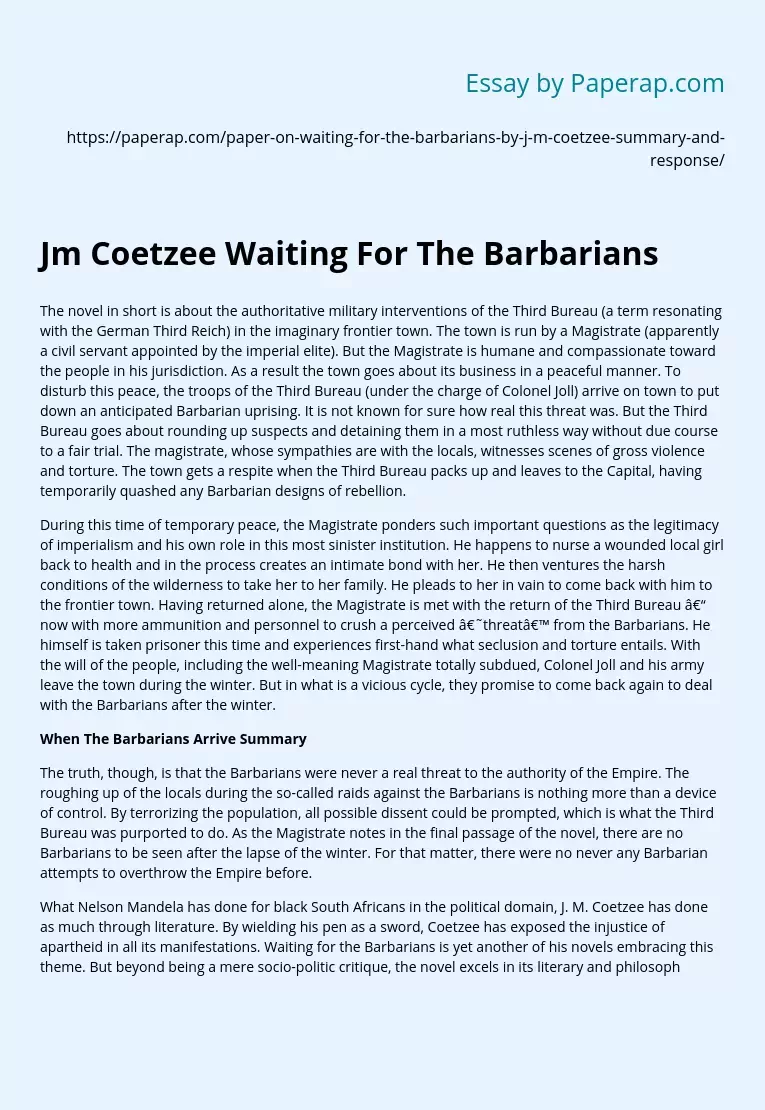When The Barbarians Arrive Summary
The novel in short is about the authoritative military interventions of the Third Bureau (a term resonating with the German Third Reich) in the imaginary frontier town. The town is run by a Magistrate (apparently a civil servant appointed by the imperial elite). But the Magistrate is humane and compassionate toward the people in his jurisdiction. As a result the town goes about its business in a peaceful manner. To disturb this peace, the troops of the Third Bureau (under the charge of Colonel Joll) arrive on town to put down an anticipated Barbarian uprising.
It is not known for sure how real this threat was. But the Third Bureau goes about rounding up suspects and detaining them in a most ruthless way without due course to a fair trial. The magistrate, whose sympathies are with the locals, witnesses scenes of gross violence and torture. The town gets a respite when the Third Bureau packs up and leaves to the Capital, having temporarily quashed any Barbarian designs of rebellion.
During this time of temporary peace, the Magistrate ponders such important questions as the legitimacy of imperialism and his own role in this most sinister institution. He happens to nurse a wounded local girl back to health and in the process creates an intimate bond with her. He then ventures the harsh conditions of the wilderness to take her to her family. He pleads to her in vain to come back with him to the frontier town. Having returned alone, the Magistrate is met with the return of the Third Bureau – now with more ammunition and personnel to crush a perceived ‘threat’ from the Barbarians.
He himself is taken prisoner this time and experiences first-hand what seclusion and torture entails. With the will of the people, including the well-meaning Magistrate totally subdued, Colonel Joll and his army leave the town during the winter. But in what is a vicious cycle, they promise to come back again to deal with the Barbarians after the winter.
The truth, though, is that the Barbarians were never a real threat to the authority of the Empire. The roughing up of the locals during the so-called raids against the Barbarians is nothing more than a device of control. By terrorizing the population, all possible dissent could be prompted, which is what the Third Bureau was purported to do. As the Magistrate notes in the final passage of the novel, there are no Barbarians to be seen after the lapse of the winter. For that matter, there were no never any Barbarian attempts to overthrow the Empire before.
What Nelson Mandela has done for black South Africans in the political domain, J. M. Coetzee has done as much through literature. By wielding his pen as a sword, Coetzee has exposed the injustice of apartheid in all its manifestations. Waiting for the Barbarians is yet another of his novels embracing this theme. But beyond being a mere socio-politic critique, the novel excels in its literary and philosophical dimensions as well. A notable aspect of the novel is its abstractness. Vaguely set in a small frontier town (whose name is not given), the controlling government and military is only referred to enigmatically as Empire. Likewise, the indigenous population that is bent on rebellion is generically termed Barbarians. The imperialist mentality inevitably assigns Barbarian status to the indigenous population which it rules over. Hence there is no room for debate about whether the native culture is barbaric or not. This is as much valid with respect to African blacks as other subjects of imperialism anywhere else in the world. Thus, the story can be read as an allegory for most acts of conquest and subjugation, with standard propagandistic declarations of protecting ‘civilization’ from ‘barbarians’, etc. Hence, Coetzee shows up a mirror to the institution of imperialism, which is not only economically exploitative but also culturally prejudiced.
The novel in short is about the authoritative military interventions of the Third Bureau (a term resonating with the German Third Reich) in the imaginary frontier town. The town is run by a Magistrate (apparently a civil servant appointed by the imperial elite). But the Magistrate is humane and compassionate toward the people in his jurisdiction. As a result the town goes about its business in a peaceful manner. To disturb this peace, the troops of the Third Bureau (under the charge of Colonel Joll) arrive on town to put down an anticipated Barbarian uprising. It is not known for sure how real this threat was. But the Third Bureau goes about rounding up suspects and detaining them in a most ruthless way without due course to a fair trial. The magistrate, whose sympathies are with the locals, witnesses scenes of gross violence and torture. The town gets a respite when the Third Bureau packs up and leaves to the Capital, having temporarily quashed any Barbarian designs .
When The Barbarians Arrive Summary. (2019, Dec 05). Retrieved from https://paperap.com/paper-on-waiting-for-the-barbarians-by-j-m-coetzee-summary-and-response/

